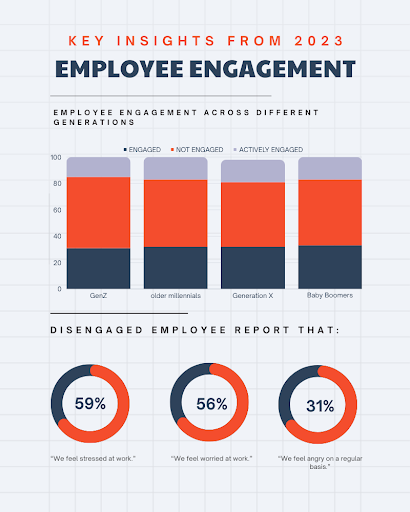In the fast-paced and dynamic landscape of 2024, the concept of employee experience is undergoing a profound transformation. No longer confined to mere job satisfaction, employee experience now embraces a holistic approach, with a primary emphasis on employee engagement as the cornerstone. This paradigm shift is reshaping organizational strategies across various industries, from Information Technology (IT) and Telecommunications to Pharmaceuticals, Banking, and Fast-Moving Consumer Goods (FMCG).
Employee Experience Prioritizing Well-being and Inclusion in 2024
-
January 19, 2024
- Author: Acengage Team

Why does Employee engagement becomes important than pervious years?
Employee engagement has gained heightened significance in recent years due to a shifting landscape in the world of work. As organizations evolve and embrace a more dynamic and interconnected business environment, the emphasis on employee engagement has become increasingly pronounced.
Unlike previous eras, where traditional structures and hierarchical models prevailed, today’s workplaces thrive on collaboration, innovation, and adaptability. Recognizing that engaged employees are more likely to contribute creatively, remain loyal, and boost overall productivity, businesses have come to understand the pivotal role of fostering a positive work culture.

In the face of rapid technological advancements and global competition for talent, companies are realizing that a highly engaged workforce is a strategic asset that not only enhances performance but also drives organizational success. As the nature of work continues to transform, the intrinsic value of employee engagement has become paramount in creating resilient and thriving businesses.
Active Employee Engagement Strategies:
Gamification in the Workplace: Making Work Fun Again
Tech Innovations Corp. implemented a monthly coding competition, “CodeQuest,” which led to a 20% increase in collaboration among software developers and a noticeable uptick in creative problem-solving.
In the competitive realm of IT and technology, companies are turning to gamification as a powerful tool for employee engagement. For instance, software development teams are implementing coding challenges and hackathons, turning routine tasks into exciting competitions. This not only fosters team spirit but also fuels a sense of accomplishment and innovation.
Similarly other industry can Gamify their workplaces.
Pharmaceuticals:
Prioritize continuous learning for research excellence, supplemented by cross-functional training and mentorship programs.
Banking:
Engage employees through financial competitions, customer service challenges, and financial literacy programs.
Fast-Moving Consumer Goods (FMCG):
Boost engagement with recognition for quality improvement initiatives, supply chain challenges, and sustainability projects.
Additional Considerations for All Industries:
Implement Employee Resource Groups (ERGs), flexible work arrangements, wellness programs, and broad recognition platforms to cater to diverse workforce needs.
Continuous Learning: Empowering Employees for Tomorrow
In the ever-evolving world of pharmaceuticals, where research and development are paramount, continuous learning is a key focus. Companies are investing heavily in learning and development programs, ensuring that employees acquire new skills to stay ahead of industry trends.
PharmaEdge Solutions instituted a comprehensive learning platform, resulting in a 15% rise in employee confidence and a 30% increase in the adoption of innovative approaches in research and development projects.
The Impact on Organizational Success:
Increased Retention Rates: The Ripple Effect
In addition to the positive shift in the banking sector, other industries are also recognizing the importance of prioritizing employee experience to enhance retention rates. In the healthcare sector, for instance, hospitals and medical institutions are implementing comprehensive well-being programs.
Case Study: FinSecure Bank
FinSecure Bank’s well-being initiatives resulted in a 25% reduction in turnover, leading to substantial savings and a boost in employee morale, ultimately reflecting positively on customer service.
Elevated Productivity: The Symmetry of Engagement
The fast-paced world of technology and software development is witnessing a similar trend. Tech companies like InnovateTech have embraced employee recognition programs, tying them to project milestones and innovation achievements. As a result, they have experienced a 12% boost in overall productivity and a marked increase in the speed of product development. The connection between engaged employees and heightened creativity is also evident in the advertising and marketing industry. AdvertiseNow, through its creative incentive schemes, witnessed a 17% surge in project ideation and a 10% increase in the delivery of cutting-edge campaigns.
“Your employees are your company’s real competitive advantage. They’re the ones making the magic happen.”
– Anne M. Mulcahy
Enhanced Innovation and Creativity
Beyond the IT sector, fostering innovation is a growing priority in the manufacturing industry. Manufacturing companies like TechProd Manufacturing have introduced collaborative projects and innovation workshops to tap into the creative potential of their workforce. This approach has not only retained skilled personnel but has also led to a 15% improvement in manufacturing processes and the development of innovative products.
Improved Customer Satisfaction and Loyalty
The hospitality industry is placing a premium on employee engagement to enhance customer satisfaction and loyalty. Luxury hotels, such as GrandResort Hotels, have implemented training programs and employee empowerment initiatives. The outcome has been a notable 25% increase in positive customer reviews and a 12% rise in customer loyalty, showcasing the direct correlation between engaged employees and delighted customers.
FreshGro Products’ employee recognition program, “Star Performer of the Month,” resulted in a 15% increase in overall productivity and a 10% improvement in the quality of products.
Agility and Adaptability in the Face of Change
The retail sector is adapting to the ever-changing market dynamics by investing in programs that promote employee adaptability. Retail giants like OmniMart have introduced cross-training initiatives and continuous learning opportunities. This has not only increased employee job satisfaction but has also positioned the company to swiftly adapt to shifts in consumer preferences, ensuring a competitive edge in the market.
Conclusion: Future-Proofing Through Employee Experience
In the competitive landscape of 2024, organizations across diverse industries are recognizing the strategic importance of prioritizing employee experience, well-being, and inclusion. This evolution from traditional employment paradigms to dynamic, inclusive cultures not only attracts top talent but also ensures sustained success in an ever-changing business environment.
In the words of a renowned business leader, “The true strength of an organization lies in the engagement and satisfaction of its workforce. In 2024, those who invest in their employees will undoubtedly lead the way to a future of sustained success.”
As we embrace the future, empowering employees becomes a strategic imperative. By learning from real-life examples in IT, Telecom, Pharma, Banking, and FMCG, organizations can tailor their approaches to unlock the full potential of their workforce.
